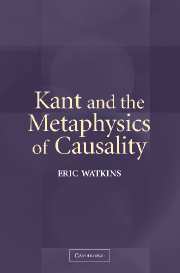Book contents
3 - Kant's Second and Third Analogies of Experience
Published online by Cambridge University Press: 12 January 2010
Summary
INTRODUCTION
While Kant's main argument concerning causality is typically located in the Second Analogy of Experience, it is clear that any interpretation that could be adequate to Kant's intentions must be able to render intelligible the text and argument of the Third Analogy of Experience as well, since it attempts to establish the necessity of mutual interaction, a notion that, as we have seen in Chapter 2, receives sustained attention throughout his pre-Critical period. Accordingly, the central task of this chapter is to reconstruct Kant's arguments in both the Second and Third Analogies in detail. After considering various aspects of the general context of the Second and Third Analogies in a first section, we develop detailed reconstructions of the arguments of the Second and the Third Analogies in the second and third sections of this chapter.
THE CONTEXT OF THE SECOND AND THIRD ANALOGIES
To reconstruct the arguments of the Second and Third Analogies properly, it is crucial to understand exactly what they are and are not supposed to accomplish. Thus, we must begin by describing both the distinctive context of the Analogies of Experience within the Critique of Pure Reason and the argumentative framework of the Analogies in general. More specifically, it is important that we understand (1) how the Analogies relate to the Transcendental Deduction, (2) that they are concerned with addressing what can be called the problem of time-determination, (3) that they are concerned with the possibility of experience in the form of the unity of time, and (4) that they should be understood as making neither purely metaphysical nor exclusively epistemological claims, but rather claims that combine metaphysical and epistemological elements.
- Type
- Chapter
- Information
- Kant and the Metaphysics of Causality , pp. 185 - 229Publisher: Cambridge University PressPrint publication year: 2004

